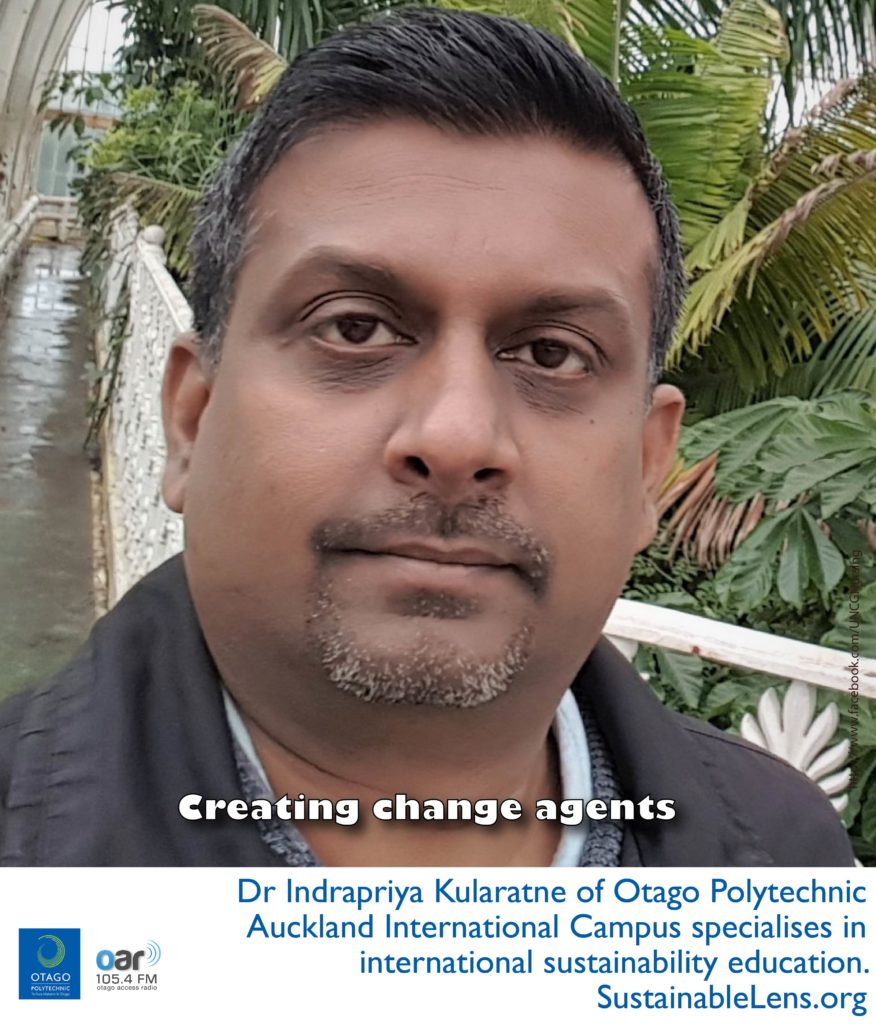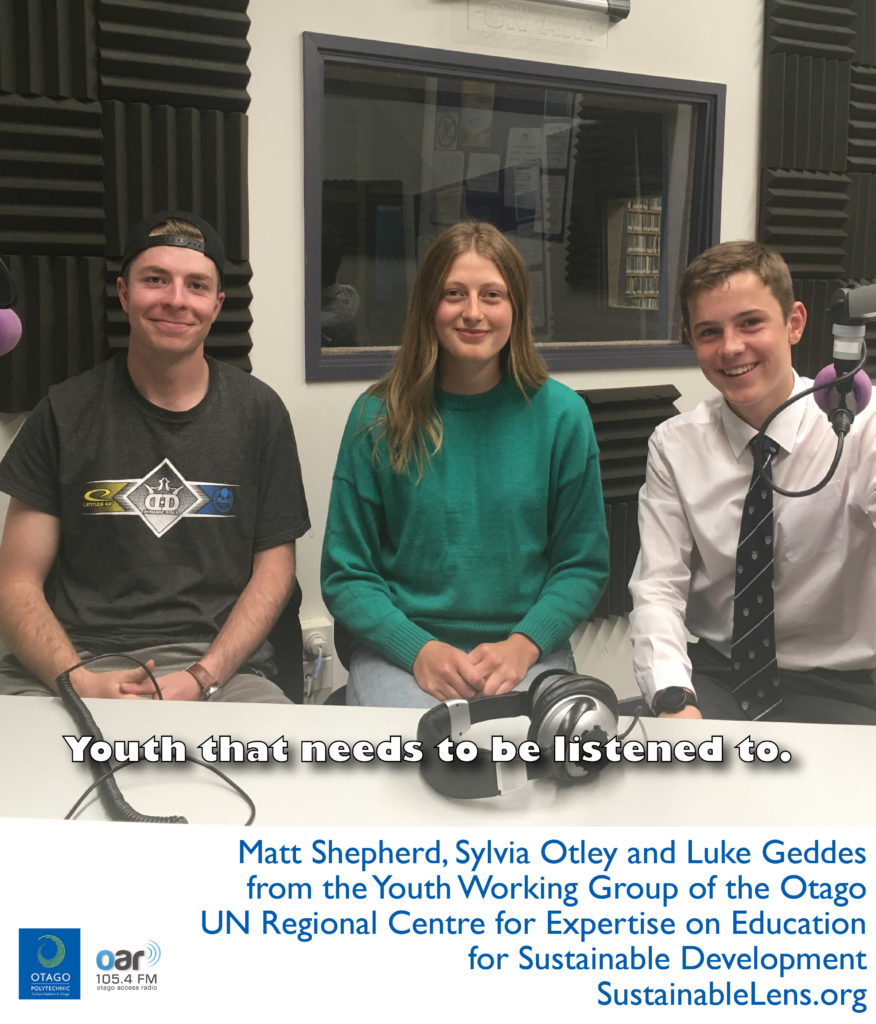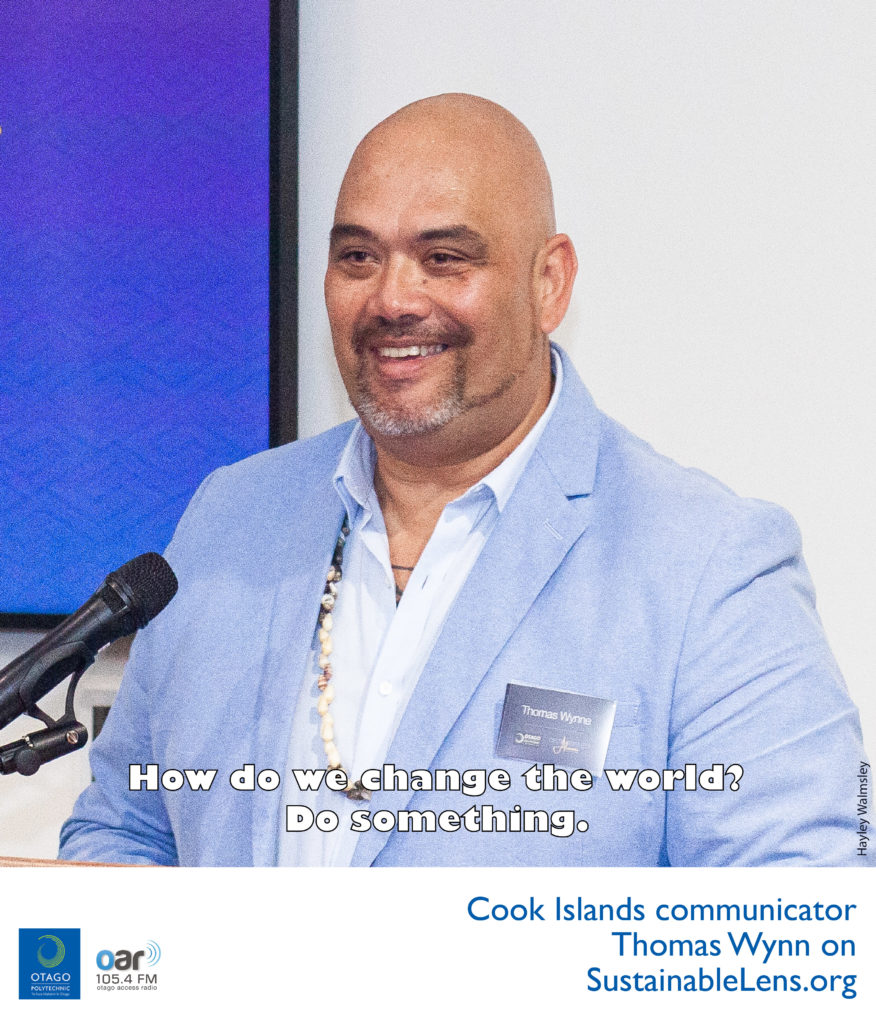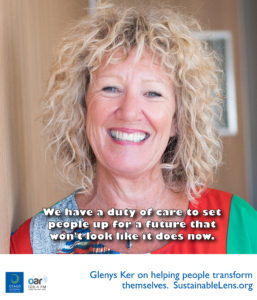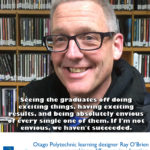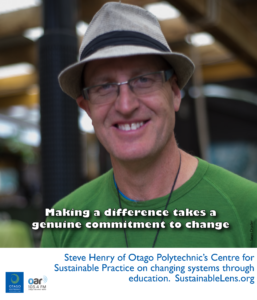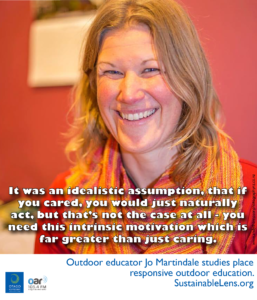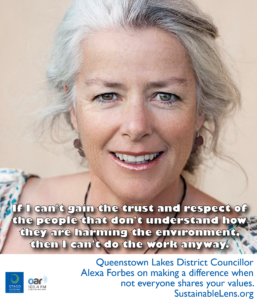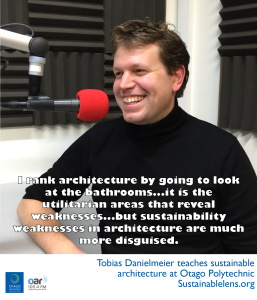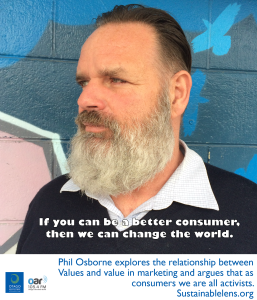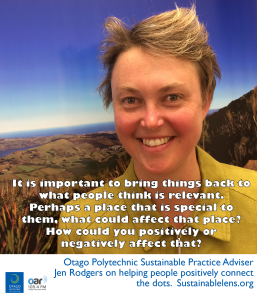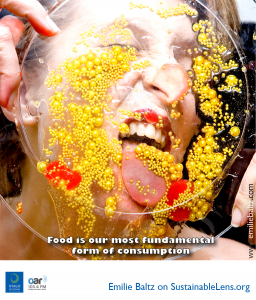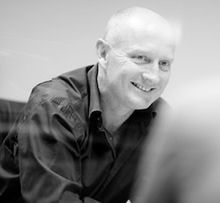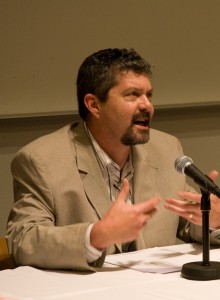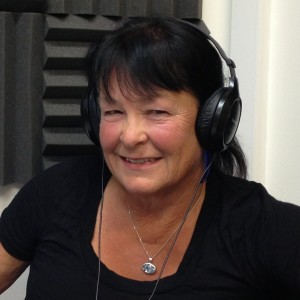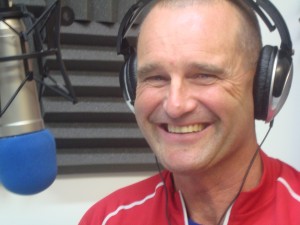| Sam: |
Welcome to Sustainable Lens, Resilience on Radio, a weekly show on sustainability topics brought to you by Otago Polytechnic. The show is co-hosted by Shane Gallagher and me Samuel Mann. Each week we talk with someone who is making a positive difference and applying their skills towards a sustainable future. In our conversations we’re trying to find out what motivates them and what it means to see the world through a sustainable perspective through their sustainable lens. Tonight’s sustainable lens is that of Steve Henry, from Otago Polytechnic’s Centre of Sustainable Practice. Stumbled over that because I know that it’s changing. Welcome.
|
| Steve: |
Hello Sam. Hello everyone.
|
| Sam: |
Let’s start with some big questions, where did you grow up?
|
| Steve: |
I was born on the Chatham Islands of all places in New Zealand, eastern New Zealand. North of Auckland, near Waikawa, Curio Bay, it’s where I spent my childhood, before moving to Christchurch, and then further south.
|
| Sam: |
What were your folks doing on the Chathams?
|
| Steve: |
My dad was a farmer. He was the only ever farm advisory officer that the government, MAF, Ministry of Agriculture and Fisheries sent to the Chathams to drain swamps and make farms more productive.
|
| Sam: |
What did you want to be when you grew up?
|
| Steve: |
I had a very informing moment around that when I was 14 when my father arranged for me to go and work on a farm. Because I saw my father on and around farms all the time. I was very keen to do that. He arranged me to go and have an August school holidays with one of his farming buddies. After day one, I rang him up and said, “Dad, I don’t want to be a farmer anymore. Can you come and get me?” He said, “Sure I’ll come and get you in another 20 days, because that’s what we’ve agreed.” That was pretty informing. And then on about day five, this grumpy farmer said to me, “You don’t like this, do you?” I went “No.” He said, “Well, what do you like?”.
|
| |
And it was a really pertinent question to ask me at the time and I respect that farmer because I don’t think I could ask that question, or I certainly didn’t hear him. But what I learned from this man, he was actually very onto it, and he gave me a lot of good guidance and we settled on being a science teacher as a way to interact with people. I had a fascination for nature and that seemed like a good place to start.
|
| |
Yeah. So that was the path I went on and I decided that at about 14, and then by 16 I decided going and learning about the natural world through science was the path I’d take, and to teach that.
|
| Sam: |
So you did the biology and …
|
| Steve: |
Yeah. The biology and chemistry thing and did a degree in chemistry and then microbiology at Canterbury University and ended up teaching, secondary teaching, going overseas in secondary teaching and really loving it. Until of course I realised it wasn’t about science, it was about people. And I loved that even more. So instead of teaching the subject, I began to work with people.
|
| |
And I had a really informative time at an alternative high school in Christchurch for 3 years teaching there. Four Avenues Alternative School, which is now shut down, an offshoot of Hagley High. And it was kind of the precursor to the Unlimited and these schools out there now which are really liberal and open minded in their curriculum. Very future-focused, and we got to customise learning for youth on average have been expelled from 3 schools. So they’re pretty colourful, but they’re really bright.
|
| |
And I found a real niche in relating to people whilst rock climbing and being outside. The Four Avenues concept in Christchurch, the four avenues represent the square mile in the city centre and the idea was that that was the classroom, instead of stuck in a box somewhere. So we very much met the learners in that square mile somewhere every day, pretty much. And we did interesting things in there, and it taught me a lot that there’s learning everywhere, if you’re willing to look for it.
|
| |
And, yeah, a wise mentor of mine said to me, “Don’t teach at that school for any more than 3 years if you ever want to get a job in mainstream education again. Because not only will people look at your CV and run like hell, but you’ll actually change to the point where you won’t want to either.”
|
| |
So I surfed that fine edge, and that led me to being overseas as a 25 year old in London, going, well, we don’t get back because it’s either going to be Wanaka, Hokitika, or Queenstown. Those were kind of my dream places and as it happened, I ended up in Wanaka working for the local high school there. Getting really into outdoor programmes and establishing outdoor education as a real powerful point of difference.
|
| |
So I moved from science being the pathway into nature to outdoor education being that and watching people having experiences in nature transforming. And I really got into that space for quite some time. So we established some cool things like seeing new students flooding to either of our school life skills type programmes and using the outdoors as a mechanism for change. Grabbing the Outward Bound and Outdoor Pursuit type models and applying them into a secondary school which was really neat.
|
| |
And then of course in Wanaka at the time in the early ’90s I watched nature before our eyes degrading. Development of a significant scale and affordability coming in, burning off of, breaking off the hillsides and watching these practises which didn’t really sit with me. So it really awakened a flame in me around, there’s gotta be a better way to do this.
|
| |
So originally I came from quite a strong ecological viewpoint that what we were doing couldn’t last. I became very interested in working out how to educate for all that.
|
| Sam: |
Taking a few steps back through that, if you were interested in nature, the natural approach, why chemistry?
|
| Steve: |
I thought the path to truth lay in detail at that time. And that hints to microbiology as well. So I got fascinated by lichens and how they operated and the biochemical nature of them. I did a lot of study around them, I studied 10-80 as a major focus for my honours degree, for example. And working with Forest Research Institute at the time, and looking at why 10-80 was the jell baits … were just getting consumed so much so quickly and isolating the fungi that was … and that sort of stuff.
|
| |
So I got very interested in the small. And then of course I realised that if you don’t understand the system that something’s in, there’s not much point in knowing more and more about this and this. And I think it was a seminal moment in realising that a systems approach was the only way to think about things if you really want to engender change.
|
| Sam: |
Did chemistry give you that system thinking?
|
| Steve: |
Yeah, Chemistry certainly gave me a fascination for atomic theory and how things are different and how things are impermanent and all those sorts of stuff, so it was almost metaphysical for me. In terms of how I viewed it.
|
| |
I became more interested in the girl in the lab coat who I ended up marrying than the chemistry, to be honest in the end.
|
| Sam: |
Different sort of chemistry.
|
| Steve: |
That’s right, it was. Yeah.
|
| Sam: |
I’m going to ask you at the end if you consider yourself to be an activist now, but were you an activist then?
|
| Steve: |
Very much. Yeah, I was involved in doing things to draw attention to what I thought was wrong. So when I think back to the early days of Hectors dolphin protests and I met Liz Slooten and Steve Dawson who are now at the University of Otago. We managed to get off there by I did Hector Stoffin and we made a fibreglass cast around the body of the dolphin and made this into a live painted model that we carried around and put in […] and raised awareness that way.
|
| |
When I was in the UK I got very involved in Friends of the Earth there. Went to corporate meetings in a suit. It really taught me that to be an activist there was actually a profession. It was very very different. This was 1989 so it was very much, ICI was still chucking barrels into the North Sea at that time, and it was very much reactionary. And Friends of the Earth took a different stance to the likes of Greenpeace, who were very confronting. What Friends of the Earth did was sit down with suits on, with the decision makers and went “Hey, could we work this out? Let’s do it a little bit better.”
|
| |
And I got involved in that quite by mistake but realised that I was very interested in bridging the gap from the corporate naiveté to something that made a difference in a long term. Which we know in the end has served me very well.
|
| Sam: |
You mean the naiveté of the corporates?
|
| Steve: |
The naiveté of the idea that we can just keep doing this as long as we like. And wanting to find that middle ground.
|
| Sam: |
Is there also a naiveté that not engaging the corporates is going to make a difference?
|
| Steve: |
Yeah, that’s right. I saw the confronting, head-on activism not working at that time, and I went … There’s got to be another way. There’s got to be a way where, and I was quite influenced at the time by reading Karl-Henrik Robert’s work around how in Sweden, that group of people have begun working with the likes of the polymer industry who are producing a lot of plastics and toxicity. Of how it would be in their interests to actually have a better solution.
|
| |
And that was news to them. They had done it from purely an engineering point of view of how can we make this stuff. And then bringing in well, how could you do it so that people actually knew there was a good story with it? And I think about hydro-polymer now which is recycling PVC and doing all sorts of stuff in Scandinavia, which was unheard of. And they went on to work it out really.
|
| |
So that was a very formative time for me.
|
| Sam: |
Around ’89 of course, is when the sustainability as a term really rose to prominence. Can you remember the first time you came across that as a term?
|
| Steve: |
Yeah, I think it was learning about the natural step and swing and, I mentioned Kyle Hendrick’s work. I was pretty impressed that the Swedes had a woman minister for the environment who later went on to become Prime Minister Bruntland. And authored probably one of the seminal reports.
|
| |
So in New Zealand very much the ministry of environments the sort of short straw that you give to your not most dynamic MP or leader. And what I observed in Scandinavia was it was taken incredibly seriously and largely because they had poisoned themselves in the 16th Century with all the mining they did when they industrialised in a big way and then when the synthetic chemical industry took off in the 1940s and 50s the [inaudible 00:11:51] lakes in Scandinavia really got polluted and people just really reacted to that.
|
| |
And it was a huge win grow and say I watched this. And we’d file on how long that’s gonna take in New Zealand to happen. It happened in my lifetime that we shifted the thinking.
|
| Sam: |
Sweden’s pretty well off, is that a luxury that they were able to now think like that?
|
| Steve: |
Well, I think I didn’t see it that way. I saw that they were well off because they made some really good choices, like putting the outlet of wastewater for a factory above the factory. And attach it to the inlet valve. You know? By law.
|
| |
It’s got a lot for me that just seemed like smart decision making rather than. So very much into the upstream thinking the stewardship type models, let’s not create waste, let’s design another system. I was pretty inspired by it. And I’ve always taken a view that I’d rather be inspired to engender change than complain about stuff.
|
| |
So I felt that the immature type of activism I was involved in in my early 20s, I felt like I got educated to actually solve it positively and Friends of the Earth was the first place I looked to do that when in London.
|
| Sam: |
Yeah. Were you still teaching at the time?
|
| Steve: |
Yeah, I was. And so I came back to New Zealand and ended up in Wanaka and it became clear to me that I wanted to do more than just educate about nature or even in nature throughout their education. I wanted to start educating for nature.
|
| |
And that was about the time that I got invited by [Jahaket] in Queenstown to run an environmental management workshop for a staff around raising the awareness within their company because they were interested in building a new building which could be environmentally friendly. Which in those days was not really thought about and it was quite. And they wanted to build a building that would be there 100 years by the [inaudible 00:13:54] and it was a neat thing too …
|
| |
And I found I really enjoyed that. So, I had a pretty open minded principal who was a boss and I said, look, do you mind if I go? A month a week, a day a month and go and do this work that’s really flooding up on. And he realised I was probably going to go if he didn’t give me that so he happily conceded to that. And here suddenly another company wanted to do that and then another one.
|
| |
Before I knew it, I found myself leaving secondary teaching and realising I wanted to get some credibility in the space. So I set up a tourism company of my own taking clients into the wilderness and really enjoyed that but also realised that my heart was in education and change rather than making a lot of money, which it was pretty easy to do. I was surprised, I set myself a target of earning 100k in the first year of operating that company and I met that and everyone said you’ll never do it, but it was … I didn’t see why you’d want to lose money if set something up with the intent of making it, if that makes sense.
|
| |
And I realised through that process that money wasn’t motivating me. It was about the difference I could make. So that’s when I learned I needed to learn more. So I went and did a master’s degree in environmental education. And it was ahead of its time really, it was online out of Griffith University out of Australia and was the only thing of its kind that I could find around then. And this was in the early 2000s.
|
| |
And … Yeah.
|
| Sam: |
You said your heart was in education and change … that rattled off your tongue as a single unit. Do you see those two things together?
|
| Steve: |
Yeah, because for me being willing to educate or … If you’re willing to educate, then you’ve got to be up for change or what’s the point? SO I did a fair bit of training in the corporate sector, you know like leadership training and team building and all that sort of stuff.
|
| |
And it taught me that unless organisations really wanted to change, it was just synthetic what we were going through. It was just a lightweight exercise. And it wasn’t real enough for me. There wasn’t enough genuine commitment to change.
|
| |
So I made a commitment that no matter how many of these companies wanted to pay me to support them to grade up. That unless they were authentic about it I didn’t want to know about it. And that became a really interesting thing. And at that time the labour government in New Zealand had the 100% pure campaign had just come out around tourism and there was a lot of optimism how [inaudible 00:16:48] government was still supporting sustainability as a development platform.
|
| |
And the ministry of tourism ended up contracting a few regions to have a go at embedding sustainable tourism. And I ended up winning one of those contracts to work with organisations in Queenstown and Wanaka. And [inaudible 00:17:06] to support sustainability on the ground in the businesses.
|
| |
So I got to go and meet and have conversations with a couple hundred businesses over a period of a couple of years. And it was incredibly insightful. As to what people’s motivations. I had this myth before them in my mind that people who own business are really on to it.
|
| |
And for some reason I felt like the people who were in education weren’t quite as worthy as people who were in business for some reason. I don’t know where that had come from. Perhaps to do with earning money and … The power and the influence that money has.
|
| |
So at that moment I realised, that when I went and talk to those people I’d rock up. And they thought I was coming in to help sort the recycling out and maybe reduce their energy bill. My first question was why? Why do you do what you? And are you interested in adding value to that? And how do you do that. And they sat down and went, crikey, well, the main reason I run my business is to get away from the wife actually. Or, I came here for a lifestyle and the bloody things grown and it’s ruined it, you know.
|
| |
And I was amazed what happened. So what was sustainable for one person was certainly not for another, if you get what I mean. That took me back to well, if we really are serious about the sustainability thing, we need to know what it means and we need to know what we’re sustaining. Are we sustaining a really bad business because someone feels obliged to? Or what are we sustaining?
|
| |
And that led me back to Scandinavia and I ended up going on a study tour there where I went there for 6 weeks and did a tour around business education and government as a part of The National Step internationals group. And it was incredibly insightful for me.
|
| |
And I did this post my master’s because I had become really interested in understanding that we can only define ecological sustainability from a set of principles. Right? And those are pretty clear at the end of the day. Don’t trash nature in its simplest form. You need to understand nature before you do that. Don’t prevent people meeting their needs essentially, fundamentally from a social science. I got very interested in that.
|
| |
So when I came back from that study tour I made a decision to ramp up what I did. On a pivotal day I started contracting staff to work for me to deliver things, by this stage I was contracting into various organisations across the country to support their programmes.
|
| |
I had a fortuitous conversation with someone on a plane from Otago Polytechnic who said, oh, we’re looking at setting up a centre of excellence around horticulture viniculture tourism in Central Otago. And this was 2005 by now. And I said oh, that sounds interesting. So I went and rocked along and had a chat.
|
| |
And I’d been already in Queenstown and Central Otago area working attempting to open up sustainable tourism so I said, well if your idea of excellence is around financial, social and ecological success, then I’m interested in that. Because for me that’s what sustainable development is, having simultaneous wins across all those areas. That worked well.
|
| |
And so I got offer that job, and I said hang on, before I take it I’d like to have a chat with your CEO, because I just want to check that we’re on the same page. Rolled on down to Dunedin and met a guy named Phil Ker who I didn’t know at all. And I walked into his office and said, look I’ve currently been offered this, and I just wanted to check that you’re really interested in sitting at the centre of excellence, but I don’t see that your organization’s excellent.
|
| |
And at the time it was a pretty cocky thing to do in lots of ways. And I realise he was either going to tell me to get out of his office really fast or we’d have a meaningful conversation about it. And of course he laughed and said, okay, so what do you see?
|
| |
And so I told him what I saw, which was an organisation which didn’t walk the talk if you’re pretending to set up a centre of excellence to provide expertise on that, then you kind of want to come from a place of credibility, don’t you? And we had a very successful conversation for an hour or two. And the long and short of it was, he said, well you come and help me sort out the organisation and take a leadership role in that, and we’ll do that centre of excellence thing once we’ve done that, shall we?
|
| |
And that led me to met you, Sam, and others at Otago Polytechnic who understood that educating for a sustainable practise and beating that into a curriculum was the most influential thing Otago Polytechnic could do. It’s a bit like Nike changing the recycling in the office but not looking at how they make shoes.
|
| |
As far as I’m concerned educational institutions, what they teach and how they teach and their curriculum is their bread and butter. It is their product. It was a great moment in 2006 to realise that, hey, here’s a tertiary education institution that’s actually committed and serious about this. And here we are now in 2017. What’s that, 11 years later is it? Is that math, no 9. Yeah 9 years later.
|
| |
And when Phil and I first had those conversations I said I reckon it will take 50 years. So don’t prod me with resourced effort, resourced focused effort. And I’m not pretending that Otago Polytech is there by any means, but it’s begun the path, and when you’re measuring how far it’s come, yeah, there’s a few indicators that it’s doing all right. A lot of people are saying it is. But when you’re involved in something you can always see what can be done differently and better.
|
| |
So that began my work at Otago Polytech, which was to go around to various, there was 16, if you like, faculties or schools inside the institution at that time. That’s been condensed a lot now, but at that time I was charged with going around and having a cup of tea with each of those to have a conversation about what could be done to embed broader economic social success thinking into the curriculum. Which was met with open arms but some of those entities, and with utter hostility by others. As expected.
|
| |
So fortunately I’d learned by going and talking to all the businesses that I had the list of an agenda I had going and the more successful the meeting was. So I wasn’t pretending to go in and tell the midwives how to implement sustainable practise in their … In what they did. Or the nurses, or the designers, or the business school, or the guys in blue overalls training the apprentices in mechanics or building.
|
| |
I learned pretty quickly to say less and listen better and have a look at where the wins were possibly going to be. And beginning to create a culture of opportunity around it rather than a culture of, you must do this or you’re evil because you’re printing too much. So, it was very much a team effort by that stage, and I joined a group of people who were committed to doing this.
|
| |
And three years later Phil said to me, we’ve just about run out of time for you doing that, thanks very much. And we’d had a lot of interest at that stage around what we were doing. And we concluded it would be a good idea to set up some kind of centre to host inquiries and perhaps run courses. And so at last the centre of excellence thing came full circle. And we had a look at setting up a centre which we ended up calling the Centre for Sustainable Practice.
|
| |
And at the same time we got given a generous grant by somebody living in the Central Otago. Â And we used that to develop qualifications, a graduate programme in sustainable practise. A graduate diploma. And at level 7 and level 5 certificate level programme. And we’ve since been running those. They got developed in 2009 and 10.
|
| |
And since 2011 we’ve been rolling out a business programme across the country, that about 120 organisations have been through now called Adding Sustainable Value. And we’ve run that in 9 regions, groups of diverse businesses coming together with the focus to embed social and ecological gain in their organisations. And if you’d told me when we started that that many organisations would have been through, I would have been thrilled. But now I’m kind of like, well is that all? It’s funny how you change your goals.
|
| |
And the graduate programmes and the graduate diploma in sustainable practise have really … They’re getting a life of their own now and it’s about 20-odd people a year goes through that programme who are wanting to lead in this space.
|
| |
So yeah that’s kind of the back story to get to where I’m at with that Sam.
|
| Sam: |
All those businesses that you’re working with, are you seeing a pattern of them changing over time, in terms of what they’re coming in to expecting sustainability will deliver? Were they seeing sustainability as a barrier, and now they’re seeing it as an enabler? What are the patterns there?
|
| Steve: |
Well, I’ve talked about the Manawatu, it’s actually a place in New Zealand … It’s pretty low profile, but actually it’s got a thriving economy. And it’s thriving because it’s a real transport hub in the north island. Toyota have got their head office there, there’s a whole lot of serious bits of infrastructure in the Manawatu, which a lot of people don’t know about. Engineering companies, and the likes of Ashhurst Engineering who make most of the pile-ons in New Zealand for transport and stuff.
|
| |
So some of these big companies have … And so Palmerston City Council recognised that they wanted to honour the local government act and have a sustainable city. Which really, it’s a surprise that so few local governments at the time made that decision given that the local government act at the time said that it was about social, economic and ecological wellbeing. Which has since been modified. But at the time they did that.
|
| |
So they organised … They had heard about what we’d done down in Queenstown. And by this time I’d realised that individually consulting with businesses one on one was a really inefficient way to use that ministry of tourism grant to reach business. We actually ended up running classes of groups.
|
| |
We’d get a bunch of high country farmers in the room and then a bunch of tourist operators. And suddenly, at one event we decided to merge this event of high country farmers and tourism operators as a bit of a trial to see what would happen. And they all walked in the room with arms folded and it was like, oh well.
|
| |
And low and behold, when we began talking, they went, hey our problems are really similar to yours. You know, when the dollar drops this happens, got these compliance pressures, we’ve got all these expectations from people not in our sector. You know we began mapping those and using some pretty simple tools to map the drivers of change.
|
| |
And Palmerston City heard that we had done this and invited me up to come and have a chat. They said, oh we’ll put on an event you could speak at. Would you be up for that? Oh, yeah, great, fantastic. So there were 110 people in the room. Half of them business owners. It was like, wow, what a surprise.
|
| |
And long story short is that the Manawatu Council ended up … And Manawatu District Council joined Palmerston City in supporting over 70 organisations, over half of our organisations that have been through that programme have been in the Manawatu. And what they did through Vision Manawatu, which is the economic development agency, was we partnered with them. So they organised all the events and we kind of came in as the experts to support organisations to think about stuff.
|
| |
So we worked out a way to do that very effectively over four one-day workshops with mentored support. As opposed to come and enrol in a course that’s going to take forever. But it was very much at work about work. The work was the curriculum for each organisation.
|
| |
And we learned from our experience, the more diverse the businesses in the room, the better learning people were finding. So that got us really excited and some of the companies who went through the Manawatu absolutely transformed the way they saw their organisation and its path in the future. So, we’re in the process of reviewing that programme right now entirely, and it’s been offered in 9 regions across New Zealand.
|
| |
We’ve had some pretty tough decisions to make along the way. Do we want to mainstream this work, or do we want to keep it as the bleeding edge, if you like? You know, because as sustainability has become more accepted and more mainstream, do we want to keep that edge of bringing the next piece in, or do we want to focus on working with the 30,000 businesses who are tied up with efficiency for example. Who are very mainstream. |
| |
|
| |
So those were decisions we were forced to make. We made the decision to attempt to mainstream this work before we got too far away from it. And in many respects that’s worked because we’re no longer needed if that makes sense. The programme has lost its relevance in the current market because it’s common practise now to implement a lot of sustainable practises that were novel in 2011. And now in 2015, 16, 17, it’s considered absolutely business as usual to implement efficiencies and do that stuff.
|
| |
So we’ve really positioned our energy now in saying, look, we don’t want sustainable as aspiration. We want restoration and regeneration as our inspiration. So we’re very interested in how organisations can add value to what they do and become more restorative and resilient and regenerative.
|
| |
Which may be new terms for people but the idea, if you like, that sustainable is cyclic. So if you can imagine conventional being quite linear. Take, make waste type industries. Greening up a bit, curbing that linear arrow a wee bit, and by the time things are sustainable they’re cyclic. So, not doing harm but not necessarily doing good either. Step in to the restorative space and you’re actually doing good while you do things. And step into the regenerative space and you’re actually having an influence where you’re providing a platform for others to do good.
|
| |
So a couple of quick examples if that’s helpful. Electric vehicles are all the rage at the moment. Great to see them coming in. It’s wonderful. A platform like Uber that has been disruptive to the conventional system, taxi ride can cost you 2 or 3 times as much as Uber and Uber’s come in and gone well, we’re going to do it differently and here’s how we’re going to do it. So you could argue that in ride share, for example, I see the potential to partner with a company like Uber to reduce the number of vehicles on the road in Auckland immensely.
|
| |
But we have compliance issues preventing that essentially. Uber are up for it, that’s clear. So the question becomes for a company like that, how do you manage the compliance, and how do you work with government to enable things to happen.
|
| |
And so the challenges are different for every organisation, Sam, to answer your question. The way sustainable would be. I mean, what are we trying to sustain? That has to be the question that’s asked now. Are we trying to sustain a whole lot of conventional based companies which are polluting and are struggling to remain profitable because someone has come in with a better business model which might be new, but it’s actually a better way to do it.
|
| |
So, I would argue the Uber taxi case, if we could work out how to tax Uber properly in New Zealand, and our laws are behind so they don’t know how. If we could work out how to enable ride sharing which we need compliance changes for drivers who can be paid to ride share. And the argument Uber are pushing is that if you’ve got a driver’s licence doesn’t that mean you’re safe to drive? If someone wants to get in the car that’s their business. And that’s very different from how the Taxi Federation see it.
|
| |
So you’ve got an issue like that which is actually constraining potentially great change. So I’m really interested in looking at things from a systems perspective and looking at how to get such change happening now. That’s really where I’m at.
|
| Sam: |
Okay, I’ve just invented a four-part scale. Because I can’t remember the five-part scale of sustainability maturity of businesses.
|
| Steve: |
Okay.
|
| Sam: |
And it goes compliance is number 1. Compliance and avoidance. Perhaps that could be 2. And then efficiency gains is number 2. Opportunity, number 3. And 4, it’s the reason for being in business.
|
| Steve: |
Yep, sure.
|
| Sam: |
Okay, percentages of New Zealand business.
|
| Steve: |
My read is that the easiest way is to start at the other end and go, so what percentage of New Zealand business that their sole reason of being in business is to do social/ecological good. Well you can count those on your hand pretty much. Right, you know? These are in the social enterprise type spaces. The Rekindles in Christchurch and they’re not very common. Seeking good by design.
|
| |
The opportunity organisation … There’s a lot of organisations now in the opportunity space. I put Otago Polytech in the opportunity space. Through its work of efficiency and getting beyond compliance. It’s actually seen that there are enormous opportunities to deliver differently.
|
| |
For example … We’re talking really differently instead of having taught degrees, 50% of Otago Polytech’s programmes are degree-based. Instead of teaching, why don’t we create an experience for example. Okay so Otago Polytech’s begun doing that very successfully through its business unit in New Zealand. So, that is one of the most sustainable initiatives Otago Polytech’s been involved in. And it’s a bit of a game-changer like Uber.
|
| |
So instead of people sitting in lecture theatres, having information rammed down their throat which they’re going to forget anyway, we’re saying, let’s harvest the experience you’ve had, and grab the learning from that. And we’ll credit you for that. So that sort of opportunity begins to do an awful lot of good.
|
| |
Other companies who are really getting into the opportunity space, and organisations, the likes of New Zealand Post, who are absolutely against the wall, with the declining mail service. The disruption’s come at them faster. So they’ve forced themselves into having disruptive challenges to see how they could do it.
|
| |
Some government departments have done it. Department of Conservation, post-Cave Creek, has done a huge amount of reinvention of itself to look at the opportunity of doing business differently. The question is will the taxi company disrupt itself so it can turn into Uber? The answer is it’s incredibly difficult to disrupt. So the majority of New Zealand businesses are in the compliance and efficiency space.
|
| |
We’ve realised with our own sustainable business programme, we don’t want to be any more in that compliance and efficiency game space. We want to work with … You can go do other courses for that now. Because it’s business as usual.
|
| |
We’re interested in that opportunity and reason for being in business space. How can you align your profitability with ecological and social good as you go? There’s some companies that are committed to doing that. And who are beginning to do that very well. They need to be celebrated more, not less.
|
| Sam: |
You said how to align profitability. So you’re happy with capitalism?
|
| Steve: |
Absolutely, I think there’s nothing wrong with people doing enterprise and getting paid for it. I don’t have a problem with it. The problem I have is when there isn’t full cost accounting around that profitability. Social and ecological harm carries the can. So if you like, what we’ve done is privatised our profits and we’ve socialised our losses. To quote Alexa Forbes in all her glory, right, from Queenstown.
|
| |
And you think about that. Take housing in New Zealand and the affordability of it. The price of allowing the free market to do what it’s done has meant that our housing system has become unaffordable. And for me that’s an unacceptable privatisation.
|
| Sam: |
So as we move away from the sustainability as usual and move perhaps back to sustainability as disruption, what are you doing about that?
|
| Steve: |
Well, we’ve begun in our graduate programmes in sustainable practice, we’ve begun to work on a great project. About 20 people a year are working on their own individual projects. And some of these projects are incredible. They’re all the people’s life’s work, you know? And they’re marvellous things, and I don’t want to name any particular projects other than to say they’re interested in transforming business as usual. That’s what they do. They’re in that opportunity space or in that reason for existing space.
|
| |
So we’re talking social ecological enterprise and we’re talking changing the trajectory of major organisations. So, with the consent of the owners and directors.
|
| |
One of the things we’ve realised is we that when we have a huge … When we sat down and designed the graduate programmes in sustainable credit we asked ourselves the question how would nature do this? If nature’s really smart, and over millions of years of evolution it’s figured out a whole lot of things. Well, how could we mimic that in the learning setting? Because nature learns essentially. Things learn. A mollusc learns how to have the right shell or the right colour so it doesn’t get eaten or a bird has learned to have a certain pattern of being. Do you get what I mean?
|
| |
And so we asked ourselves, what does that look like for learning? And the answer of course has to start with diversity. You can not operate in a single sector. So the dairy sector will never willingly disrupt itself, is my conclusion around that for example. Or those who are real estate agents in the housing sector where they’re making more and more money it seems for doing less and less work as housing is a commodity that’s traded. They’re not going to disrupt themselves.
|
| |
It’s a combination of having to come in and go right, where can we make a difference? And that’s really what we’ve been asking ourselves the question now. Is how can we make a difference?
|
| |
And so, perhaps the argument is going away from it being about sustainability and sustainable practise, to how can we make a difference to go down from compliance to efficiency gains to opportunity to reason for being there.
|
| |
And if people can have their awareness shifted to see the opportunity, to shift along that trajectory. And that’s what happened for the sustainable business programme. Of the 120 businesses that have gone through, I’d say that 20 have changed their reason for being essentially. And probably 50 have done it for efficiency gains, and trying to get their head around this thing that’s coming at them, all this disruption. And the rest have done it for the opportunity.
|
| |
We’ve very much learned, if you focus on the opportunities, people are much more engaged in the conversation. Much more willing. Rather than saying what you’re doing is wrong, and it’s evil and it’s going to be outdated soon, so stop doing it. Well that doesn’t go down very well. Whereas you say, there’s more and more risk to your brand, there’s more and more pressure coming.
|
| |
And I think about there’s a beautiful thing called a law of three which has … One of the three is pushing in and this is the activating force if you like. So you’re asking about activism, so this activating force say might be the desire to lower a carbon footprint. And you get this constraining force pushing against that activating force, which is business as usual using carbon. And not having solutions to do anything else or it being not convenient for a business model.
|
| |
And when those two forces collide that can do one of two things. They can either … And I’m holding my hands punching into each other with fists here, and they can either go up or they can go down. If things go down around there, you go into denial and carbons classic for this. I mean, carbon, schmarbon as far as I’m concerned. I think it’s one of the smaller issues for New Zealand to think about.
|
| |
You go into this compromise position of it decreasing the energy and everyone loses basically. So you end up making shitty carbon trading platforms and offsets which to me seem quite ludicrous. And complex systems and hide behind the bureaucracy of that. Rather than saying, hey look, we’ve got this confronting challenge coming. There’s an increasing force to de-carbonize. So hey you carbon guys, what is the opportunity for you to move that and evolve it? And reconcile that and therefore evolve.
|
| |
So in other words the law of three is when you’ve got an activating force and a constraining force, if you can take it into the direction of reconciliation, then you can evolve it.
|
| |
And I think what we’ve done with those 20 organisations who really got it was to say look. And they saw the change coming. They know what’s coming. Digitalizing things, and ecological challenges, the price of resources. Moving things around. Customers intolerance of single-use products. All that sort of stuff. Driving change. Okay how can we evolve what we do?
|
| |
And when an organization’s willing to say how can we evolve what we do as opposed to oh the laws coming, it’s going to kick us in the bum, then you begin to have a different conversation. It’s a conversation of possibility.
|
| Sam: |
Some questions to end with. What’s your go-to definition of sustainability now. You’ve talked about how it was, but what is it now?
|
| Steve: |
It can go on and on forever.
|
| Sam: |
But you’re not using the sustainability word anymore?
|
| Steve: |
Not much, no because I think I’ve found it isn’t effecting change as efficiently, as well as talking about making a difference.
|
| Sam: |
And people see the on and on forever meaning we don’t have to change. Whereas the hidden secret really is that in order to go on and on forever we need significant change.
|
| Steve: |
Yeah.
|
| Sam: |
So maybe we need to make that transformation explicit, as you’re doing.
|
| Steve: |
Yeah, that’s right.
|
| Sam: |
What’s the biggest success you’ve had in the last couple of years?
|
| Steve: |
Biggest success. Designing myself out of the system of the graduate programmes that I’m involved in. Yes, so it’s not dependent on me. I think Otago Polytech’s success at embedding into its curriculum is something I’m very proud that I’ve been associated with. But that’s a team effort. It’s not just me. Yep.
|
| Sam: |
And you can go sailing every day.
|
| Steve: |
I can, I live by the sea and I find that I do much more productive work if I spend an hour a day at high tide out having a little sail.
|
| Sam: |
We’re writing a book of these conversations. We’re calling it Tomorrow’s Heroes. So, what is your superpower? What’s your sustainable superpower.
|
| Steve: |
I think being able to bridge the gap between the world of being a dirty hippy as I used to be, but not now, I’m kind of a corporate hippy. Being able to bridge the world of being a deep green thinker and understanding natural systems and understanding the systems we’re in and being able to see that.
|
| |
And being able to relate with a group of people who are either in ties or have no concept of wanting to think broadly. Being able to present to them the case that we’re going to be forced into holism anyway. So being able to articulate that I think is my super power. To motivate people in that conversation, to see the possibility of what they could do rather than, oh my god this is so big. I’ll go and top myself now. Seeing it as a positive opportunity rather than a downer.
|
| Sam: |
What do you do … How do you present it as a positive opportunity for … I’m thinking of the farmer that recognised that you weren’t going to be a farmer. But let’s say that farmer found themselves into dairy farming and they’ve got a massive debt and … We might like to paint them as being baddies but they’re kind of against the wall.
|
| Steve: |
Yeah. And they’ve designed themselves into a pretty inflexible space. So they want freedom more than … Just as I don’t want the cows poo in the water. They don’t really want it there either when you talk to them.
|
| |
So, looking at what they can do to make a difference and the best thing that you can start with is to have a conversation. Not come to you’re evil, you’ve done it badly. I’ve found that doesn’t help. Being judgemental I guess is what I’m saying. Is that it doesn’t help. Because they know. It’s not that they don’t know. They do know.
|
| |
My biggest frustration is with the high level of indifference our governments have shown to having some policies with teeth. I mean that deeply disturbs me. And undermines my trust in the governance. In the democracy we’ve got. Which, I’m lucky to have. But it challenges me greatly.
|
| Sam: |
When you’re running a session, do you front load with doom?
|
| Steve: |
Very little. It’s very much. Rights, let’s get the doom out of the way. Who thinks? It’s very much. It’s probably … If you’ve got a day to give it it’s literally 3 minutes. It’s like, rights, what’s wrong. Waterways are stuffed, this is happening, carbon monoxide levels are going up, this is … Right, we’ve got that out of our system, right.
|
| |
So, now we’ve said all that, can we actually focus now on doing something about it, rather than continuing the mantra of what’s wrong. Because while we put energy into what’s wrong, it will continue to be wrong. Let’s put energy into making a difference, towards changing it. Yep.
|
| Sam: |
What do you do if you’ve got someone that’s stumbled into your class that sits at the back saying, this is all garbage, he’s still a dirty hippy.
|
| Steve: |
No, they don’t come. We’ve kind of … One of the things we learned early is with organisations we don’t just want the environmental manager to come thinks. The CEO either needs to be there, or the leader, you know someone from your leadership team at a big organisation. And they need to buy into the process.
|
| |
So we learned instead of just one person enrolling and turning up, you’re allowed to bring up to 4 people from the organisation to the first workshop, so we’ve kind of been insisting that the leadership folks come to the first workshop so they can see this is an opportunity not a smashing session. If you get what I mean.
|
| Sam: |
So, you said you used to be an activist. Are you still an activist?
|
| Steve: |
Yeah, very much.
|
| Sam: |
In what way?
|
| Steve: |
I think I’m being influentially disruptive in the education system. But positively. That’s how it feels to me, so I’m kind of being an activist by stealth I guess. But it’s not by stealth because it’s just what I do. And it’s not seen as by stealth.
|
| |
I’m not out there with placards waving my arms around. It’s in there having conversations and supporting people who are willing to change. And I’ve found there’s more people who are willing to change than I thought.
|
| Sam: |
I think that that was one of the things that we both found quite surprising, was how little opposition there was. Most people didn’t know what to do, but there weren’t many who said let’s not do this.
|
| Steve: |
No, there was a pivotal day in 2005, wasn’t there, when we got 80 people in a room at Otago Polytech, which at the time represented about 10% of the staff. Roughly didn’t it? Or 12% of the staff. Something like that. And someone asked, Phil Ker asked the question, is there anyone who thinks we should not go down this pathway? And there was silence. That’s like right. Let’s go.
|
| Sam: |
What motivates you? What gets you out of bed in the morning?
|
| Steve: |
I see it’s that I’m making a difference. That I’m having a life that’s worth living, I guess. Yeah, that gets me out of bed in the morning.
|
| Sam: |
What challenges are you looking forward to in the next year or so?
|
| Steve: |
I’m really excited about taking the idea of qualifications by experience and turning that much more into projects. If we’re harvesting people’s experience into qualifications, can we generate those experiences without teaching? Without this traditional idea that you have an adult who stands there, who knows more than you and vomits on you, knowledge-wise.
|
| |
Through just supporting people to make a difference. Because I think there’s a whole lot of people very keen to make a difference. And get credit for it. So that interests me a lot.
|
| Sam: |
Watch this space. Because we’re working on it aren’t we?
|
| Steve: |
We are too.
|
| Sam: |
If you could wave a magic wand and have a miracle occur tomorrow morning, what would you like to have happen?
|
| Steve: |
I think I’d love to see much more cooperative working than solid working. What I mean is to have well-intentioned organisations almost competing in the non-governmental sector. And government I’d love to see a lot more integrated holistic planning/design.
|
| |
I’d like to see schools drop the curriculum as they have in Finland. There’s no school subjects in Finland anymore in secondary school, which I think is an incredibly wonderful way to go.
|
| |
Yeah, what else would I do if I could wave the wand? I’d change the tax system to be entirely transactional. I’d use the block chain and these other new algorithms to run a lot of our systems, banking systems, accountancy systems, law systems.
|
| Sam: |
And lastly, do you have any advice for our listeners?
|
| Steve: |
I don’t feel I do really, Sam. What’s the advice I’ve got. I think being a crusader in the sustainable practice space.
|
| Sam: |
Thank you very much.
|
| Steve: |
Be kind to yourself. That’s my thought.
|
| Sam: |
Thank you very much for joining me.
|
| Steve: |
It’s a pleasure.
|
